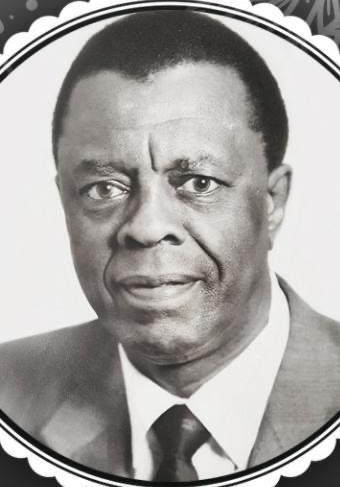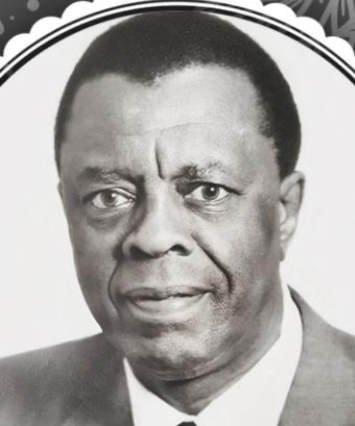Professor Cornelius Marivate's call to the South African Parliament was as disconcerting as it was sudden. 'Out of the blue, one Friday in October 1996, I received a telegram from Parliament telling me to report there on Monday,' he says.
'No explanations - just get down to Cape Town, these are the travel arrangements, this is where you will be staying and you will be sworn in as a Member of Parliament.'
From Pietersburg, where he was serving as a member of the Northern Province's Public Service Commission, to Cape Town, where South Africa's Parliament sits, is 2,000kms. The journey he made that weekend to take up a seat as Member of Parliament for the African National Congress (ANC), South Africa's ruling party, took him into a new and tough world - far from the ordered academia where he had spent his working life.
At the age of 71, Cornelius Tennyson Daniel Marivate is South Africa's leading authority on the literature and folksongs of his own Tsonga people.
He was born and brought up on a Swiss mission station close to the Mozambique border in South Africa's Northern Province.
'My father was a school teacher there and later became a pastor,' he says. 'I followed in his footsteps.' In 1948, at the age of 21, he began teaching in a primary school while studying by correspondence for his school-leaving certificate.
His fascination with the literature of his people also came from his father. 'When my father preached and told stories he used words in a strikingly musical way - what the English would call onomatopoeia,' he recalls.
When he received his Bachelor of Arts degree from the University of South Africa in 1963, he was invited to join the university's African Languages Department as a lecturer. He did his Master's dissertation on Tsonga folk tales and his Doctorate, in 1982, on 'the ideophone, or onomatopoeia, in African languages'. He went on to become the head of the department and retired in 1992.
He has 'mixed feelings' about his time in national politics. 'As an academic, I spent my life searching for truth, the reality behind things. But in politics, they don't do it that way. If anything, politics is selective with the truth.'
He speaks only after careful consideration and with a shake of the head that affirms the regret one senses he feels at opportunities lost.
'Unless you're a real statesman in politics, you always look for the weakness and faults of your opponents and capitalize on them. So instead of building up the country, you put all your energy into scoring points.'
As an example, he cites education - one of the three parliamentary committees on which he serves. (The others are arts, culture, language, science and technology; and public service and administration.)
South Africa had 14 different departments administering segregated education under the former apartheid government. The new government set about creating a single structure where the funding discrimination of the past would be eliminated.
Yes, Marivate admits, there are huge problems in trying to remake education - and, yes, mistakes have been made. 'But now those very same people who created the impossible infrastructure (supporters of the former National Party government) are trying to capitalize on the problems being experienced in changing the system instead of trying to help find real solutions.' Both sides of Parliament are guilty of this negative approach to politics, Marivate concedes frankly.
Asked if the ANC government is trying to do too much too quickly to resolve problems which have been decades in the making, Marivate is emphatic. 'The Government is faced with large numbers of disadvantaged and very poor people who have nonetheless very high expectations,' he asserts.
'These expectations are valid. This government was voted into power to realize them. We have to be seen to be delivering.
'Frankly, it's a balancing act between available resources and expectations. Move too slowly to redistribute and the revolution will be right here. Move too quickly and we'll run out of resources and bankrupt ourselves.'
At the same time, he adds, the government needs to prioritize. 'We need a far more concerted approach to tackling poverty far more meaningfully across a broad front. At least 61 per cent of our people are on the poverty line, earning R350 or less a month (about GBP36).
'We have to help these people to develop both economically and educationally. You cannot develop uneducated people.'
Marivate is totally opposed to handouts. He is concerned about the spread of the dependency syndrome in South Africa. 'Too many people, even those who are still young and strong, are trying to get social pensions fraudulently.'
In its place, he pleads for a development plan that is based on mobilizing people's energy, innovation and generosity rather than their outstretched hands.
'If we could get companies, organizations and individuals to help poor communities to set up core industries at the local level, we would begin to put development into the hands of the people,' he says with conviction.
For example, building material depots could be set up and training given, so that people could build their own homes. As well as tackling the country's huge housing problem, this approach would build people's self-esteem and generate further economic activity. 'Alongside this, adult literacy and skills training should be built in.'
Once people have begun to help themselves, Marivate sees the Israeli kibbutz system as a model with definite pluses for South Africa. 'Their community spirit, the way they build economic muscle - this could be a wonderful system for some of our impoverished rural areas,' he says.
'We have no choice: we must get our rural people out of their reliance on subsistence farming. They need new ways of doing things in order to develop out of the poverty trap.'
Marivate is determined to use his energies to sow the seed of this approach in the Northern Province where he began his career as a teacher 50 years ago.
It was in this poor area that the turning point of his life came, in his late twenties.
'At that time, South Africa was still in the early days of implementing formal apartheid,' he recalls. 'Travelling somewhere in the north, I ended up on the wrong side of a traffic policeman's fists and landed up at a mission hospital where I met a Swiss doctor, Margaret Zuber.
'Angry and bitter at the treatment by the policeman, I was a candidate for some good advice, none of which I wanted to hear!' Nonetheless, he says, Dr Zuber persuaded him to go to an MRA conference in Johannesburg. 'In order to get me there she lent me her new car! There I saw outstanding examples of black and white people working together as equals to solve problems.'
He also found himself confronted by the need for personal change, in the light of the absolute standards of honesty, purity, unselfishness and love espoused by people at the conference. 'I came from a church family; I was always a person who prayed,' he says. 'But I had prayed without really uncovering my faults. Faced with these four standards, I had to look at myself in a way I had never done in my life. It put me on a path from which I could never turn back.'
Not least of the results was a new appreciation of his father whose strict, uncompromising nature had long since alienated him.
'After the cloud of hatred I had built up around my father had evaporated, I could appreciate the abilities and gifts which made him an extraordinary person.' His father died six years ago, and Marivate now hopes to write his biography and to collect his songs.
This ambition places a question mark over whether he will stand for Parliament again when South Africa goes to the polls before the middle of 1999.
'I am in two minds about my political future,' he says. 'I know that if I tackle an election campaign and go back to Parliament for another term I will not get the time to write about my father and, before I bow out of this world, that is one thing I really want to do!'
Over the years he has attended MRA conferences all over the world. 'These built into me the values that have helped me to put politics into its true perspective. I know what I really want to fight for and that is to oppose the culture of point-scoring. I am not impressed by the attitude of vilification that underlies the parliamentary system we have inherited from the West.
'Instead, I want to work to create a South African parliamentary "soul" - a spirit that builds on the political miracle that was spearheaded by President Nelson Mandela, who tries to see and bring out the positive in opponents as well as supporters.
'I would like South Africans to be seen as people able to build real reconciliation and to work things out without revenge. If I can help this to happen, I will have contributed something truly worthwhile.'



